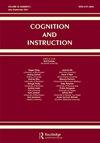异质性寻求模式课程中学生的认识承诺
IF 2.6
1区 心理学
Q2 PSYCHOLOGY, EDUCATIONAL
引用次数: 4
摘要
摘要关于建模的研究强调了异质性在科学学习中的重要性。与此同时,越来越多的学者寻求认知和表征融合的课程途径。针对这种紧张关系,我们提出了两种结构:寻求课程和承诺的异质性。寻求异质性的课程强调产生和重视现象的多重表征,提供了一种科学形象,突出了学习的混乱、非线性方面。致力于通过关注塑造学生模型的价值观来进行平行的认识认知研究;然而,承诺并没有在学生的建模中寻找学科实践,而是以学生的价值观为出发点,将其映射到科学教育中通常没有预见到的学科资源中。使用承诺的视角,我们分析了寻求异质性的六年级建模课程的六种实施方式,并将承诺的视角与认识理想的视角进行了比较。然后,我们证明,在这种情况下,承诺在建模过程中充当评估资源,起到了认知理想的作用。然而,承诺也超越了这一角色,帮助学生提出和探索课程中没有预料到的问题,将现象视为学生建模工作的客观和外部现象,并将其展示为课堂多维建模话语的产物。本文章由计算机程序翻译,如有差异,请以英文原文为准。
Students’ Epistemic Commitments in a Heterogeneity-Seeking Modeling Curriculum
Abstract Research about modeling emphasizes the importance of heterogeneity in science learning. At the same time, a growing body of scholarship seeks curricular pathways for epistemic and representational convergence. In response to this tension, we propose two constructs: heterogeneity-seeking curricula and commitments. Heterogeneity-seeking curricula emphasize generating and valuing multiple representations of phenomena, offering an image of science that foregrounds messy, nonlinear aspects of learning. Commitments parallel epistemic cognition research by focusing on values that shape students’ modeling; however, rather than looking for disciplinary practices in students’ modeling, commitments take students’ values as a starting point, mapping them to disciplinary resources not typically foregrounded in science education. Using a lens of commitments, we analyze six implementations of a heterogeneity-seeking 6th grade modeling curriculum, and we compare the lens of commitments to the lens of epistemic ideals. Then, we show that, in this context, commitments functioned like epistemic ideals by acting as evaluative resources during modeling. However, commitments also extended beyond this role by helping students ask and explore questions that were not anticipated by the curriculum, problematizing a view of phenomena as objective and external to students’ modeling work and showing them instead to be a production of the classroom’s multidimensional modeling discourse.
求助全文
通过发布文献求助,成功后即可免费获取论文全文。
去求助
来源期刊

Cognition and Instruction
Multiple-
CiteScore
7.90
自引率
12.10%
发文量
22
期刊介绍:
Among education journals, Cognition and Instruction"s distinctive niche is rigorous study of foundational issues concerning the mental, socio-cultural, and mediational processes and conditions of learning and intellectual competence. For these purposes, both “cognition” and “instruction” must be interpreted broadly. The journal preferentially attends to the “how” of learning and intellectual practices. A balance of well-reasoned theory and careful and reflective empirical technique is typical.
 求助内容:
求助内容: 应助结果提醒方式:
应助结果提醒方式:


